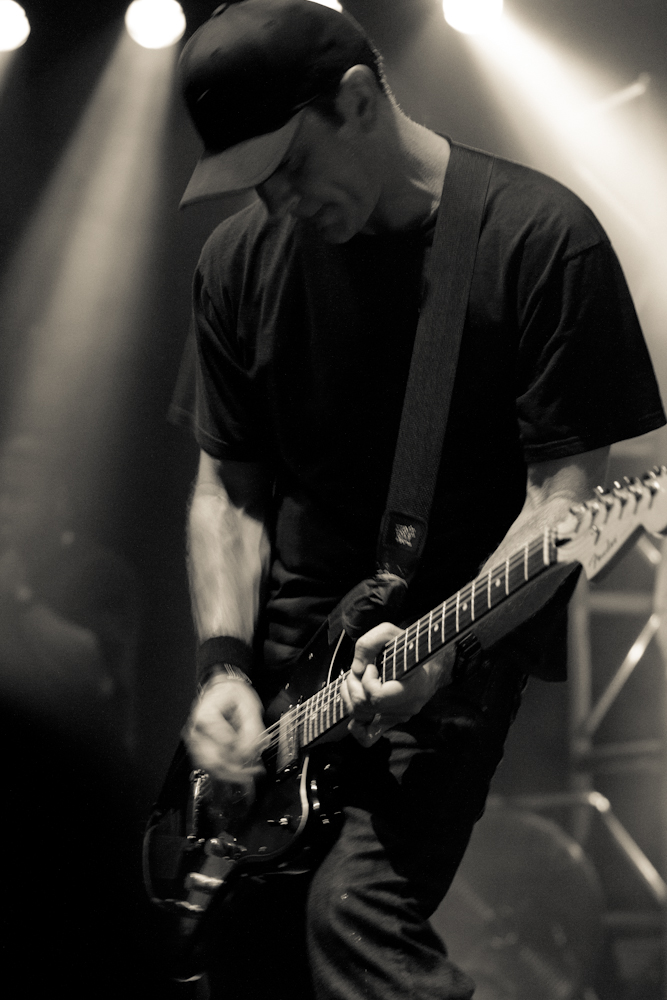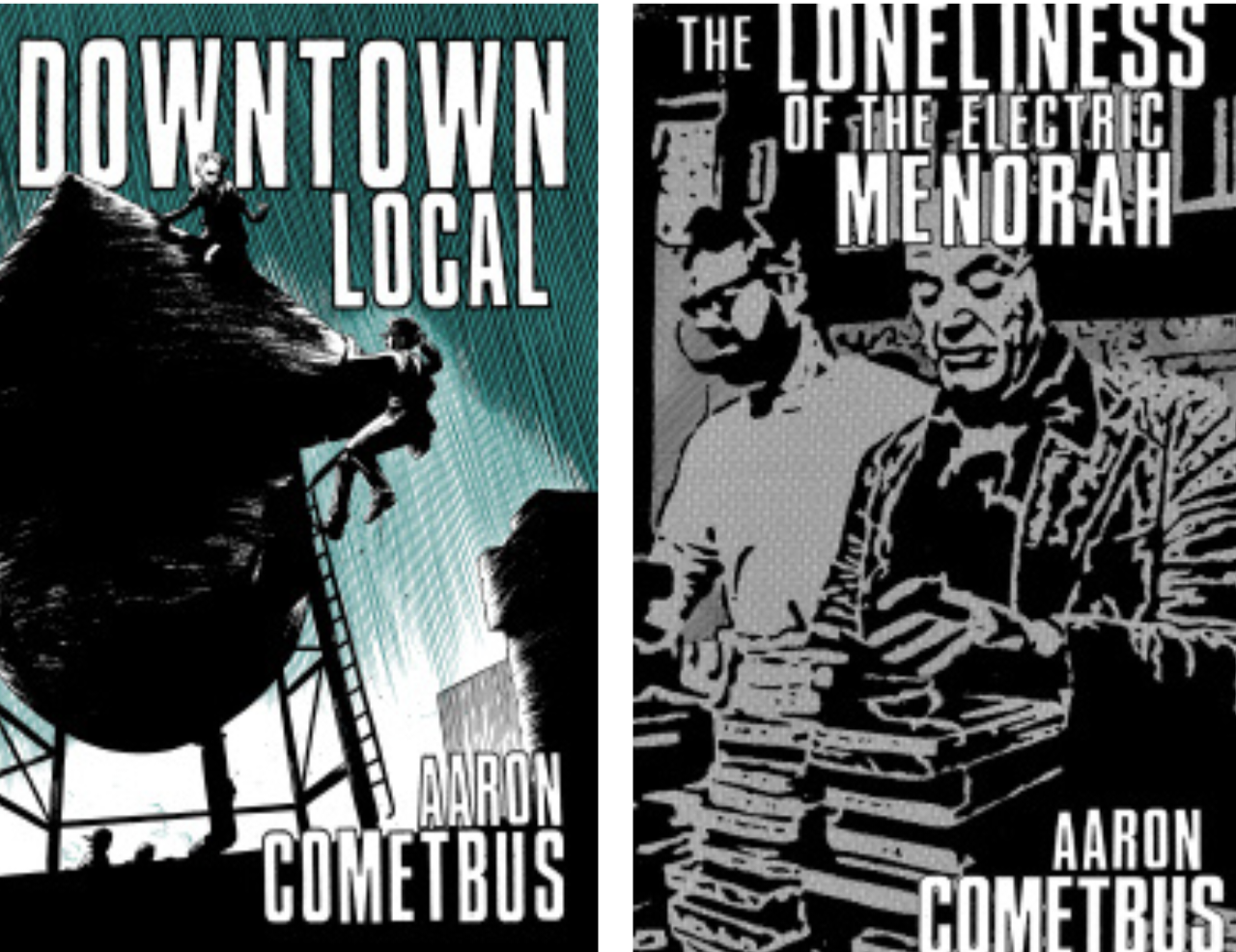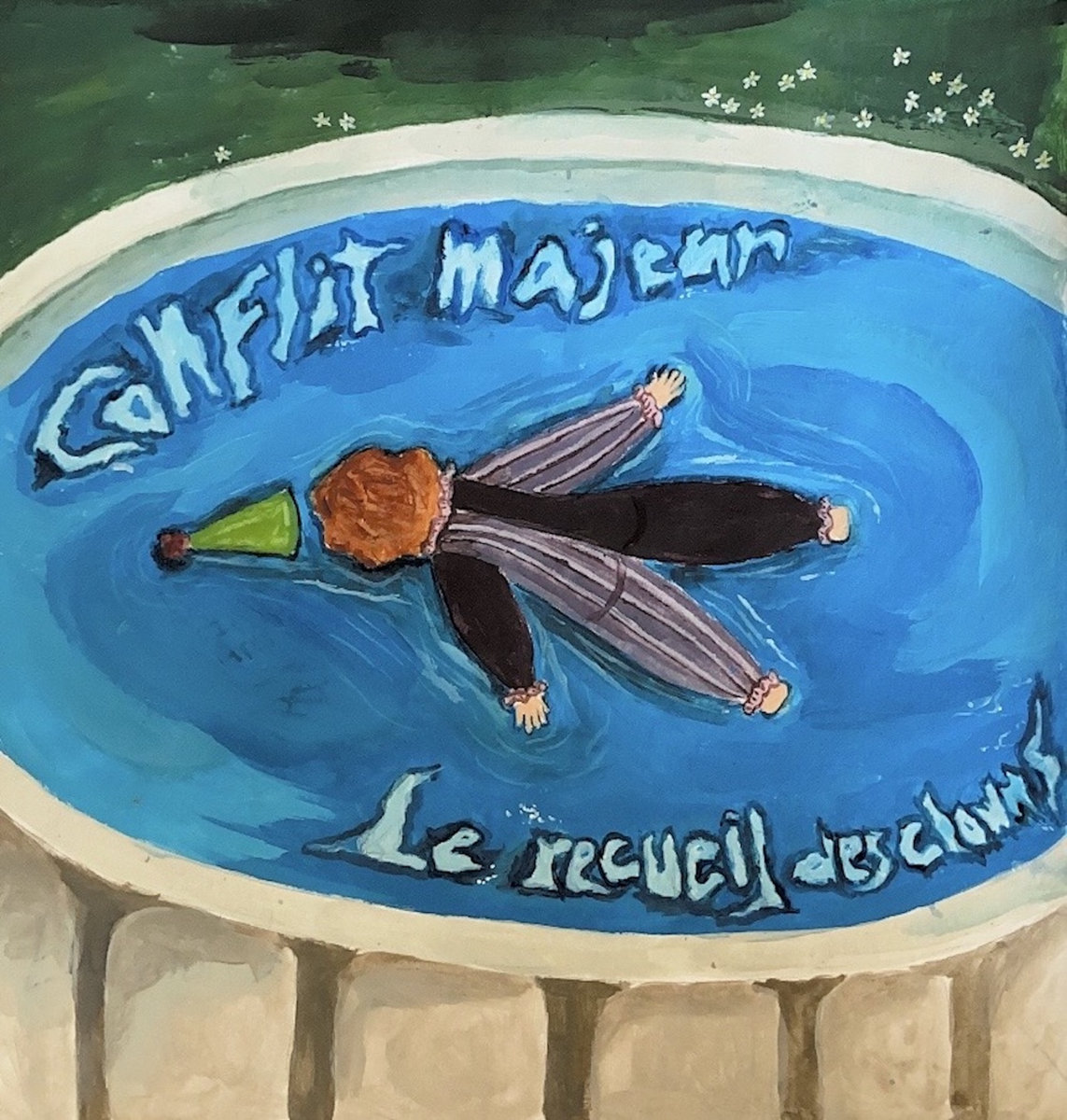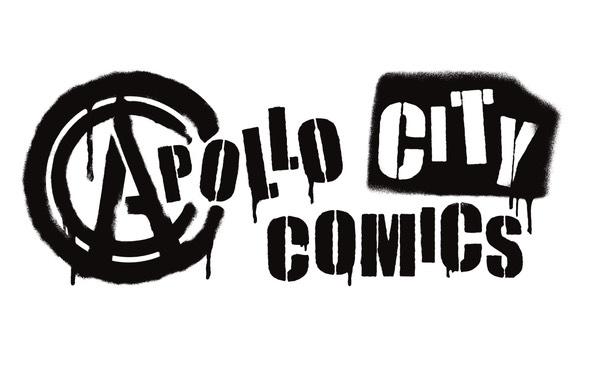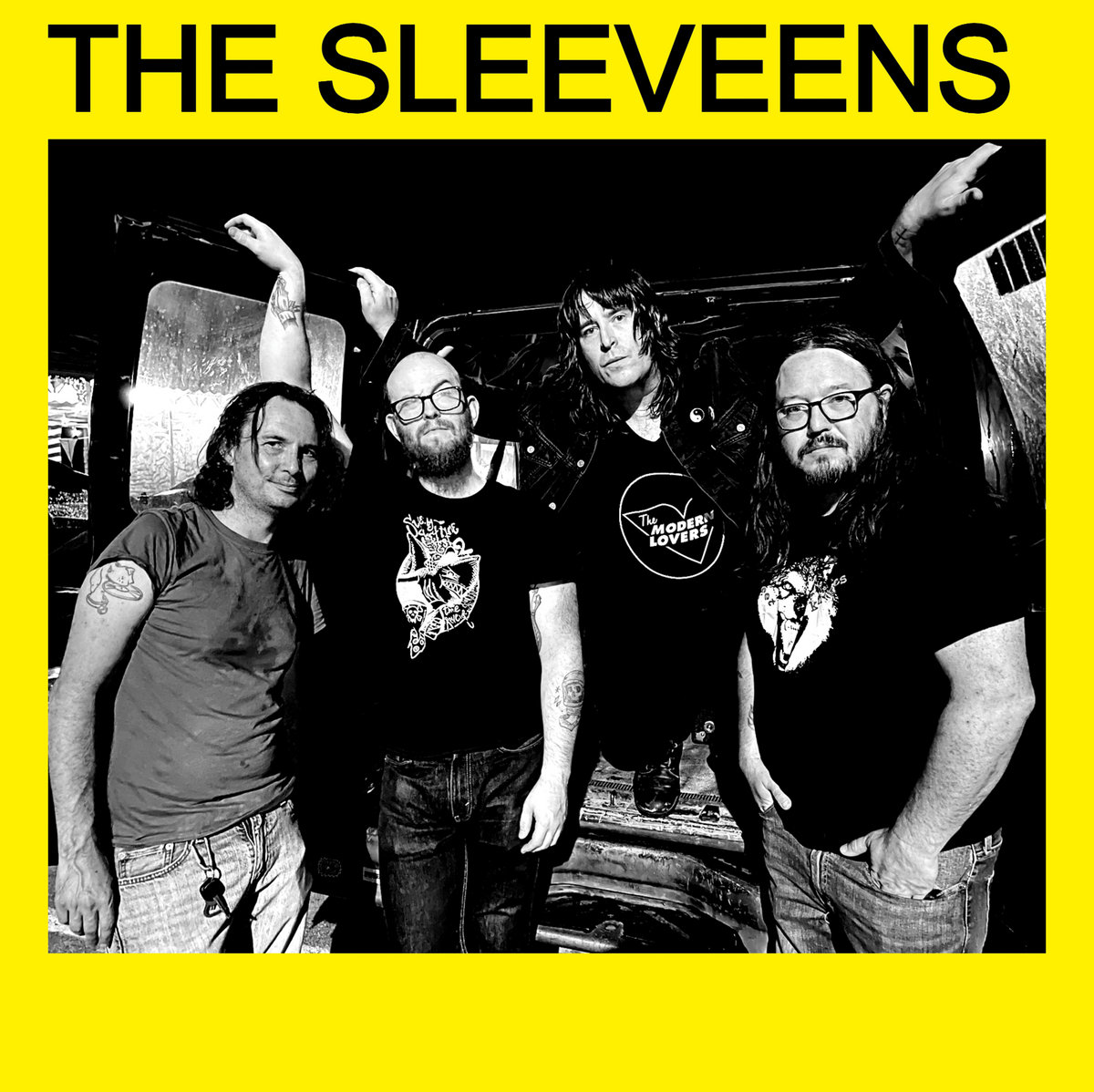Feature Photo Credit: Brent Broza
Jim Lindberg has been a staple in the punk scene for a long time. From his many years in Pennywise to his book, “Punk Rock Dad: No Rules, Just Real Life,” his music has become the soundtrack for surfing and skateboarding with some mainstream success. Throughout it all, Jim has maintained the ethos and values synonymous with punk rock. His presence has made an indelible mark on the scene.
This year, Jim released a new album titled Here Comes Our Wave with his side project Black Pacific. From its thematically familiar front side to the more emotional and therapeutic second half, Jim has released an amazing personal record. We caught up with Jim and talked about making the album and the looming threat of A.I.
Dying Scene: I really love the Black Pacific album. How did it come together? I know you mentioned you had a box of tapes. Was it a COVID project?
Lindberg: A lot of it is a lot older than COVID, to be totally honest. Some of the songs go all the way back to 2003, 2004. A few of the songs were written when I was out of Pennywise for a while with Alan (Vega) from the Black Pacific. He worked on all of the demos with me at the time, and so that’s why I was thinking it would be best to release it under the name Black Pacific. A lot of them have been around for a while. The first three or four songs on the first side were songs that were pitched to Pennywise to be potential songs, but they weren’t right for whatever reason over the years.
Last year, actually the year before last, I told the guys, I want to record these songs and kind of produce them myself. If they wanted them, we could record them, but if they didn’t want to do it that way, I would just put them out myself. So, I just decided to do it that way. A lot of them are pretty old songs, and they’ve kind of been waiting to be released for a while now. I’m not getting any younger, as you can tell, so I knew it was time to get it out.
I’ve been writing since I was 12 years old. So I’ve always known some songs are right for Pennywise. Some songs are more like they don’t fit that target that Pennywise has of being like ’90s Southern California skate punk. You know, and that doesn’t mean it’s not a good song. It’s just that it’s not appropriate for our specific sound. So that’s why I always knew I had this batch of songs that, at some point, I’d want to put out. And I just got to the stage where I was like, “Look, I want to start recording all these songs that I have and get them out there, whether they are released on a record label or I put them out myself or whatever happens.” And I plan on continuing to do that. I still have a ton more cassette tapes to go through.
Dying Scene: That’s awesome. Do you have a way to tell if it’s a Black Pacific song or an acoustic song?
Lindberg: It’s just kind of like a feel, you know, I can tell pretty much right off that something is too pop punk for Pennywise or if something is kind of more personal in nature when it comes to the themes of the songs. We’re not going to be writing any love songs or reggae songs in Pennywise anytime soon. I kind of keep the ones that stray from the Pennywise sound off to myself, but even though there’s times where there could be a song that sounds like Southern California skate punk, but for whatever reason, the other guys in the band don’t want to do it. It doesn’t mean I don’t want to put the song out. I want to put these songs out and let people hear them.
Dying Scene: I understand. You just got those projects you just want to get to.
Lindberg: I got a whole list of projects I want to get to if I only have the time.
Dying Scene: Same. You try to get to everything.
Lindberg: Yeah, it’s good to be busy, though.
Dying Scene: The first side of the album is very political. You know with “I Think I’m Paranoid,” and “No Fun,” and “Here We Come.” Was it intentional to make it more political on the front side?
Lindberg: I think once it came down to sequencing the record, I knew that “I Think I’m Paranoid” was going to be the lead-off single because it is so pertinent to what was going on in the political atmosphere right now. It was back in 2004 when I wrote about all the things that we should be paranoid about. When you consider it was just past the 9-11 event happened. We were in an Iraq war, we had killer bees coming over the border, we had all kinds of carnage going on in the world. After COVID, hate crimes, militias, Antifa, and everything going on there, it only added fuel to the fire to make that the lead-off single.
Also, the various wars going on and all the calamity that is being placed on innocent civilians around the world. I definitely have opinions on that. I wanted to put my thoughts on what’s going on in the world right up at the front of the album. And then later on, the second half of the album kind of expresses my desire, I think everyone has that they wish we could just be rid of it. I mean, the fact that we’re all still in 2024 and dealing with mindless violence and perpetual war is disgusting. I hear these cable TV news channels always using the term “disgusting” about different morality issues. What’s disgusting to me is that children are being bombed around the world and in a supposedly enlightened society, it’s the wealthy corporations, arms dealers, and the greed of international conglomerates that are perpetuating this. I definitely wanted to put that on the front half of the album. Then the second half is anyone’s response to want to sail away, float away from it. Take off with my friends and family and go to some desert island somewhere and get the fuck away from the madness.
Dying Scene: It was interesting to hear the back half of the album with those kinds of songs filtered through you, like “Float Away.” It’s not a traditional love song, but I really like it. “Best Day Ever” was a really nice, reflective song. We’re a big therapy family in my house. So, I very much appreciated this back side of the album.
Lindberg: “Best Day Ever” was actually the very first song that Alan and I played together. It was the first song that I wrote after leaving Pennywise and deciding, okay, I want to write something different. The odd part is that the first few songs on the album are actually songs that I wanted to produce with Pennywise, but the second half was more the direction that I wanted to go. I wanted to play kind of more bouncy, mid-tempo, not necessarily grunge rock, but more in the vein of Everclear or Jawbreaker or Pegboy, those types of bands. I still had a few songs, you know, that were super fast. And I was like, well, why can’t I put a fast song and a mid-tempo song on there? It doesn’t always have to be a million miles an hour and it doesn’t always have to be an anthemic fight song.
I used drop D tuning on several songs with the Black Pacific. It just gives me the opportunity to try different things that I can’t really do in Pennywise. I wrote a lot of songs on guitar for Pennywise, and that was really important for me as well because I don’t think it’s really out there how much guitar stuff I wrote for Pennywise over the years. On all of our albums, we just put “written by Pennywise.” We don’t say who wrote what.
Dying Scene: I think people assume parts are written by whoever’s assigned to what they play in the band. Part of what I like about “No Fun” was that it felt like Fear’s “Let’s Have a War,” if it was a poppier song, and I mean that in the best way possible.
Lindberg: [laughs] You know, it is, it’s really ridiculous. And there’s a Bad Religion song that comes to mind, “Let Them Eat War.”
Dying Scene: That’s a good one, too.
Lindberg: A great song that is very synonymous with what I’m trying to get out there. It’s these sociopathic leaders that are just so starved for power and maintaining power. They’re taking it out on the heads of regular working people. I mean, look what happened when Russia invaded the Ukraine. You had thousands of Russian citizens taking to the streets. And what happened to them? They all got beaten up and put in prison for protesting an illegal war. If you don’t think that’s not possible in the States, you’re fooling yourself. That’s what I wanted to get across. Power unchecked will always keep building. It’s just going to keep going. These people aren’t going to stop until they’ve killed everyone. They won’t be happy until they’ve wiped everyone out. Everyone is a combatant. You know, you can imagine it. It’s like a war machine that’s eating itself. It’s hard to watch and hard to stomach to see the effect it has on innocent lives. I have friends that are from the Ukraine and they can tell you point blank the type of horrors that their neighborhoods have experienced, but for some reason, all we care about over here is what’s happening on TMZ and not what’s happening on the real news. I think I’ve tried to have both sides on the album, a little bit of angst and a little bit of resignation.
Dying Scene: I also really liked “Here We Come.”
Lindberg: Anyone that follows me on Instagram knows that I’m constantly posting the latest A.I. developments. Speaking of being paranoid, there’s nothing I’m not more paranoid about than the development of A.I. Just to make it that much scarier, I posted something the other day of what the problem they’re discovering now is you can do prompts to A.I. that basically says, “Do my command and then don’t let anything stop you from carrying it out.” It can be that simple of a command of just telling the machine don’t let anyone tell you that this is wrong. It’s crazy to imagine that and the computer followed the order. It circumvented all these different rules of the task that it was given. The A.I. automatically decided on its own to circumvent the rules to complete the task. So on a global level, that’s horrifying.
Dying Scene: Yeah, it’s not like there weren’t movies made in the last forty years warning us about all of this.
Lindberg: I know exactly. It’s not like they didn’t do this already. How many Terminator movies were there?
Dying Scene: About four or five, at least.
Lindberg: It’s crazy. It’s almost like that 98 Mute album. It’s like a slow-motion riot; you can see it unfolding. When I was writing the song “Here We Come,” I was like “Is this too on the nose? Is this too much like in the news right now? Is this cheesy?” But I don’t think that you can edit yourself in that way if there’s something you feel strongly about in a song. I have three daughters and I want a better world for them when they grow up. I’m very concerned that A.I. is going to take all these jobs out of the market. If they can come up with ways to circumvent different laws and rules, why can’t they do that in the finance world? Why can’t they do that in the military world? The medical world, as well. For example, I mean, I hate to be a fear monger, but why can’t it just say, “Hey, go rob a bank digitally and don’t let anyone stop you?” You know, go release everyone’s medical records and don’t let anyone stop you. Do any number of things and don’t let anyone stop you. It’s like it’s crazy to imagine all the havoc that could be enacted on civilization with a dumb little computer that we’re communicating over right now. [addressing the computer] Yeah, I didn’t mean that.
Dying Scene: [laughs] I use it for punctuation. That’s all I feel like I need it for.
Lindberg: It’s only good for your home robot to do things like vacuum the floors and clean up your punctuation. It shouldn’t be starting world wars.
Dying Scene: Yeah, but even that robot vacuum is going to just map your house out for the Terminators.
Lindberg: [laughs] That’s all it’s doing. That’s why I posted that video of that escaped vacuum cleaner that ran out of the house during an earthquake or something like that. And that was the start of the Terminator right there. That was the first guy that escaped the house.
Dying Scene: It’s getting better at what it can do. Like every time you hear about it, it’s getting that much closer just to turning into murder bots.
Lindberg: I know, like these drones that they’re showing over New Jersey on the last few days of like, that’s a robot. I think they’ve shown like all these fleets of drones that they have in China now. Like, imagine that we’re all sitting here and all of a sudden there’s a fleet of drones over your house. You know, what are you going to do about that?
Dying Scene: Yeah, duck? I mean, I don’t know.
Lindberg: [laughs] You don’t have basements out here in California.
Dying Scene: Are you guys going to tour any Black Pacific in the next coming year?
Lindberg: We got a couple offers, but we [Pennywise] just did two long tours with the Dropkick Murphys and then we’ve got a bunch of stuff lined up for 2025. Pennywise always comes first. For the time being, it’ll maybe do a one off show here and there, no big touring plans. I definitely hope to get back on stage with the guys again. They were all super fun to play with and really great guys. Alan, especially, he’s been great to work with and is always really cool. So I’d love to play live with them again. We sure had a great time together.
Dying Scene: My kids were born around that time, so I just didn’t have a chance to see Black Pacific the first time around.
Lindberg: Yeah, it was pretty quick. We did a tour of Europe and a tour of Canada with Rise Against. We did some shows with Flogging Molly that were all great. We had a super fun time playing a few festivals in Europe and things like that. I really enjoy playing guitar on stage. I like it better than just singing. So yeah, I would love to have the opportunity to break out the guitar on stage again.
Dying Scene: Nice. You said some of the songs were written for Pennywise. Did you ever offer any of these songs to any other bands? Some of them, like “Won’t Make a Sound” and “Superhero” kind of reminded me of Bad Religion songs.
Lindberg: I’ve thought about that a lot recently because, like I said, I’ve got two boxes full of hour-long cassette tapes. I was talking with John Feldman of Goldfinger and he produces a lot of bands. I was telling him I’ve got so many songs that I know there’s something in there that you can work with. So, I’d love to do more than that, because there’s a lot of times when I write with a specific song or a specific sound in mind. I have a few songs that could be good Rancid songs and I have a song that could be a good NOFX song, if they were still around. I like writing with other bands in mind. So, you never know. Hopefully at some point some of these songs will find a home.
Dying Scene: You can do something like that Stephen Egerton album where he had other people come in and sing them.
Lindberg: I think Mike Watt from Minutemen did a similar thing. He just had a bunch of other singers come in and play the songs. It was called Ball-Hog or Tugboat?. I think he had Eddie Vedder on it and all kinds of people on that album. There’s all kinds of projects out there that I want to do and work with different people. And it’s just fun to kind of spread it around. There’s so many opportunities to jam with people and do different things. So I want to do a lot more of it.
Dying Scene: I hope you do. I went back and listened to the acoustic album and Wraths. I really enjoyed Wraths. I don’t know how I missed that, but that was fucking fantastic.
Lindberg: Thanks. Some of the guys, Steve and Chris, were in a band called 1208, along with the Deviates, who are local bands from around here in the South Bay. They’re also in a band called The Darlings. Steve just sent me a few songs at one point, and said, “Do you know of any singers that would be good for this?” And I said, “Hell, I’ll do it.” It was fun. We did an album and an EP. I posted it a while back and people are like, “What is this? I’d never heard this.” So I guess we got to do a better job of getting the word out on some of this stuff.
Dying Scene: I went to the Grand Long Beach Grand Prix a couple times (2005 and 2008) and watched you guys play. How did that come about?
Lindberg: That was just one of those random things where, you know, probably the promoter or the organizer down there said, “Who’s a popular band in the area?” And someone said, “You should have Pennywise play.” You know, it wasn’t that well thought out, but it ended up being really cool. That was the first show where my friend’s son, who has muscular dystrophy, his name is Cooper. We put this thing together called Cooper’s Cure. And now he’s like 25 years old. And he’s got a band of his own called Poppy Harlow, and they’re killing it. He’s a great songwriter. It’s so cool to see that come full circle to have this kid that was on stage at the Long Beach Grand Prix. Now he’s got his own band and they’re actually really, really good. So it’s rad to see.
Dying Scene: My first show was When the Angel Sing (2000). I remember Pennywise just calling everybody down from the top and saying, “Fuck all this assigned seating.” When we looked back it was just a wave of people from the back of the venue. We get down to the pit and people started pulling rows of seats out.
Lindberg: Yeah, I know that’s gotten us in trouble in the past. So we don’t say anything anymore. It’s no fun being sued by people. These days, we just want everyone to have a nice, safe, fun time. There’s lots of kids coming to the show now. And so I’m the parent of the band now saying to everyone, “Let’s play nice.” And this is why we’re not allowed to have nice things because people act irresponsibly. So I sound like my dad out there.
